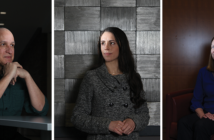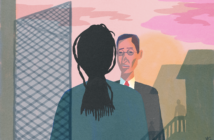She hoped to get accepted to medical school in spite of being a writer. Brown wanted her because she was one.
I would not be a doctor were it not for Brown. I don’t mean that with hyperbolic nostalgia, as in: Brown made me what I am today. Nor do I mean it concretely, as in: I went to medical school at Brown, ergo Brown transformed me into a doctor. What I mean is that I can’t imagine I would ever have gotten into medical school were it not for Brown.
After majoring in French in college I went to graduate school for creative writing and then took a job teaching high school English to support my entirely nonlucrative life as a poet. I was one of four faculty members in the first year of a new charter school in California. Which is also to say that at 24 years old, I was a high school’s entire English department. To fill the student body, the school’s founders had accepted a large number of students who had been expelled from other public schools. Many had spent time in juvenile detention centers. Many were on legal probation. I had never taught high schoolers before. It was, perhaps, not the arrangement most likely to foster a love of teaching.
Nonetheless, it did give me insight into the weighty and numerous issues that the 14- and 15-year-olds in my classroom were juggling as they tried to read the books I had assigned them. “Ms. Machine,” they would call out to me, because my last name reminded them of the Spanish word motor, “if Holden Caulfield has two parents and a fancy school and all this money, then why does he spend so much time bitching about his life?”
“Yeah, or at least why do we have to read all his snively, pansy-ass bitching?” another would chime in.
“If I met him near my casa I’d give his spoiled white ass something to bitch about!” a third would shout out, at which point the class devolved into laughter, clapping, and congratulatory fist bumps. “Let’s watch the language,” I’d say, reflexively, as I did a hundred times a day. But all the while I’d be thinking how perfectly right it was for the to be impatient with Holden. How little I’d understood about the students I would have, and their lives, when I had taken the job How irrelevant my reading list had turned out to be, carefully culled from the books I had taught to the eager students of a prestigious university just the year before. How inaccurately I had imagined these children, who turned out to be all full of bravado and street smarts and dressed in rival gang colors, but who were inarguably children all the same.
The stresses of my students’ lives sometimes seeped into school time and sometimes poured in. Our school had no money for a guidance counselor. We four teachers filled in where we could. That meant that I went to the hospital with a 14-year-old freshman who needed a rape kit done after a friend of her father’s had gotten drunk and come into her room the night before. It meant I took assignments to the juvenile detention facility where my 15-year-old student was held after she beat a neighbor girl so badly that the girl fell into a coma. It meant that I talked with the psychiatrists who had questions about my students’ school performance, and who prescribed them medication upon medication upon medication.
One of my students was so sedated by antipsychotics prescribed for aggression that his words slurred, and he fell asleep in class. Another began an antidepressant, and before long started doing her homework and stopped carving “Die Motherfucker” into her forearms with a razor.
It struck me that medicine had the potential to both ameliorate and impair. At the time, I tended to be mistrustful of psychopharmacology. Yet over and over again I saw that it was often the first-line treatment for psychic distress in this group of disadvantaged kids. They did not have health care that would pay for them to be in twice-a-month psychotherapy, but they did have coverage that paid for their daily doses of new, expensive psychiatric medications whose effects had only minimally been researched in children. Sometimes the medicines helped my students, and other times they didn’t. I wondered wherein the difference lay.




